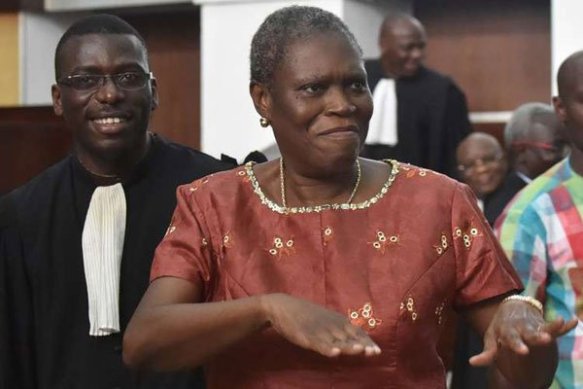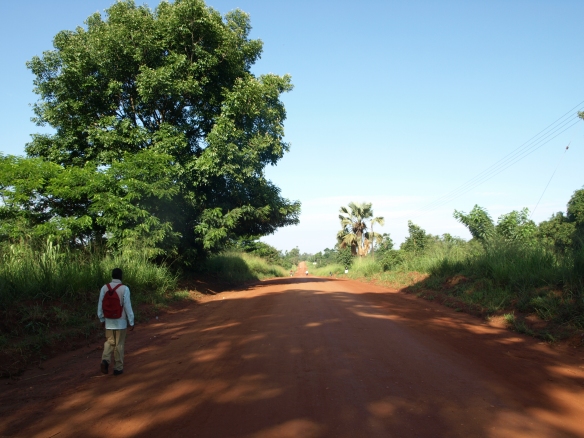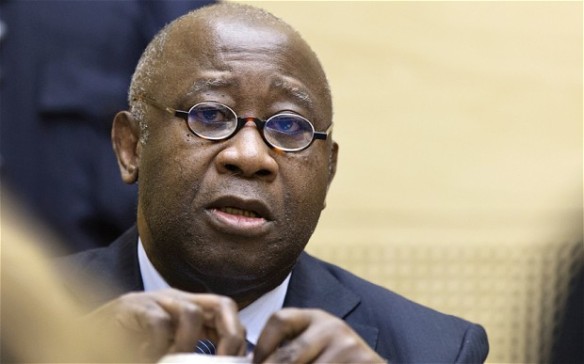Beyond The Hague welcomes Maïté Van Regemorter for this guest post on the right to liberty at the ICC. Maïté is a PhD candidate at the Brussels School of International Studies, University of Kent. After working four years as a lawyer specialised in criminal law, migration law and international human rights law, she is currently working at the Belgian tribunal dealing with migration issues.
Until very recently, the ICC had never granted interim release to an accused against whom a warrant of arrest had been issued. Therefore, the ICC’s statements that ‘when dealing with the right to liberty, one should be mindful of the fundamental principle that deprivation of liberty should be an exception and not a rule’ and ‘pre-trial detention is not to be considered as pre-trial punishment and shall not be used for punitive purposes’ appeared to be rather theoretical. As a reminder, the right to liberty admits the possibility to detain someone who has allegedly committed an offence but requires it to be provided for by law and to be strictly necessary since the presumption is in favour of release. The respect of the right to liberty by the ICC could thus be questioned. Nevertheless, on 21 October 2014, Judge Cuno Tarfusser ordered the release of the four co-accused of Jean-Pierre Bemba in the case regarding the offences against the administration of justice. This ruling demonstrates the relevance of the right to liberty as such and of the ICC cooperation regime for the application of this right. In this post, I will endeavor to explain why.

Jean-Pierre Bemba (center), with his lawyers Kabongo (left) and Musamba (right), photo: ICC
ICC rules related to the right to liberty
The first thing to note is that no reference to the right to liberty is made in the ICC instruments. Nonetheless, there are several provisions with the issuance of an arrest warrant ordered by the ICC and the possibility of interim release before it, the main ones being respectively articles 58 and 60 of the ICC Statute. At any time after the initiation of an investigation, when the prosecutor identified a person who allegedly committed crimes within the jurisdiction of the court in a place where a situation was open, the prosecutor can apply to the Pre-Trial Chamber for the issuance of a warrant of arrest if the arrest appears necessary (i) To ensure the person’s appearance at trial; (ii) To ensure that the person does not obstruct or endanger the investigation or the court proceedings; or (iii) Where applicable, to prevent the person from continuing with the commission of that crime or a related crime which is within the jurisdiction of the Court and which arises out of the same circumstances. After his or her transfer to the ICC, the accused may apply for interim release before the Pre-Trial Chamber that will control whether these conditions are still met. After the first application for interim release, this control is done every 120 days until the beginning of the trial. After the start of the trial, this control ceases to be automatic but the accused may still spontaneously apply for such release. Article 60(4) of the ICC Statute, also provides that release may be granted in case of detention for an unreasonable period prior to trial due to inexcusable delay by the prosecutor.
The case regarding the offences against the administration of justice related to the Bemba case
On 20 November 2013, the ICC issued arrest warrants against Aimé Kilolo Musamba and Jean-Jacques Mangenda Kabongo, two lawyers of Jean-Pierre Bemba’s legal team, and of Fidèle Babala Wandu and Narcisse Arido, two of Bemba’s close friends because of their alleged criminal responsibility for several offences against the administration of justice. According to Judge Cuno Tarfusser, several factors justified their arrest: the gravity of the offences, the risk of flight demonstrated by their possibility to travel freely and to benefit from Bemba’s network and the risk for the administration of justice and of committing new offences demonstrated by the nature of the offences. The subsequent reviews of detention concluded to the persistence of these risks until 21 October 2014.
On this day, Judge Cuno Tarfusser ordered their release on the basis of article 60(4) of the ICC Statute, namely because of the unreasonable length of detention. He took into consideration ‘the advanced stage reached by these proceedings, the documentary nature of the relevant evidence and the fact that such evidence has by now been acquired in the record, all of which – contrary to what stated by the Prosecutor – also result in reducing the risks that these proceedings or the investigations might be obstructed or endangered, that the alleged crimes be continued or related offences be committed’. He concluded that ‘the reasonableness of the duration of the detention ha[d] to be balanced inter alia against the statutory penalties applicable to the offences at stake in these proceedings and that, accordingly, the further extension of the period of the pre-trial detention would result in making its duration disproportionate’. The Prosecutor appealed this decision but her request for suspensive effect was rejected by the Appeals Chamber.
Why would this decision demonstrate the relevance of the right to liberty for the ICC?
At first sight, the answer is not necessarily obvious since the decision of 21 October makes, unfortunately, no mention of this right. Nonetheless, by being the first decision ordering an interim release, this decision finally gives some practical content to the ICC’s statements related to the fact that deprivation of liberty should be an exception and not a rule.
Yet, it is interesting to note that Judge Cuno Tarfusser did not limit his decision to a strict application of article 60(4) of the ICC Statute, which provides that release may be granted in case of detention for an unreasonable period prior to trial due to inexcusable delay by the prosecutor. On the contrary, Judge Cuno Tarfusser applied article 60(4) in conformity with the right to liberty as recognised by international human rights law, which requires that an accused must be automatically released when his or her length of detention is unreasonable, without distinguishing who is responsible for the delay. Admittedly, Judge Cuno Tarfusser referred to the guarantees of a fair trial instead of the right to liberty when he noted that, ‘the fact that the duration of the detention of the Suspects’ is not due to the Prosecutor’s inexcusable delay does not relieve the Chamber of its “distinct and independent obligation… to ensure that a person is not detained for an unreasonable period prior to trial under article 60(4) of the Statute”, which obligation is a corollary of the fundamental right of an accused to a fair and expeditious trial’. Nevertheless, it is clear from the context of the decision that Judge Cuno Tarfusser was also concerned with the accused’s right to liberty.
It must be noted that, by adopting this ruling, Judge Cuno Tarfusser acted in conformity with article 21(3) of the ICC Statute, which expressly provides that ‘the application and interpretation of law pursuant to this article must be consistent with internationally recognized human rights’. While it is unfortunate that Judge Cuno Tarfusser failed to expressly mention either article 21(3) or the right to liberty in his decision, this ruling is important regarding to the relevance of this right for the ICC since, rather than limiting his decision to a strict application of the ICC Statute, he applied it in light of the requirements of the right to liberty.
Why would this decision of release prove the relevance of the ICC cooperation regime?
This ruling also demonstrates that the respect of the right to liberty could only be a reality before the ICC when the States Parties agree to cooperate with it. In fact, the previous reviews of detention demonstrate that, without the identification of a state willing and able to implement the release of an accused, such release is not possible and that, therefore, the respect of the right to liberty is impossible as well.
For example, during the first reviews of their detention, the four accused applied for release either in their country of origin, Belgium for Kilolo and DRC for Babala, or in the countries where they had a right to stay, the UK for Mangenda and France for Arido. According to Regulation 51, the observations of these states and of the host state were required in order to know their opinion regarding a potential interim release on their soil. At first, all of them refused. Belgium raised the lack of legal framework for the implementation of such release, while the DRC noted their inability to prevent the accused from committing new offences. On the other hand, France, the UK and the Netherlands signaled their opposition to accepting the accused without any further explanation. It must be noted that, in March 2014, Belgium and the ICC signed an agreement regarding, among others, a potential implementation of an interim release ordered by the ICC on the Belgian territory. The agreement as such is confidential but the Belgian law implementing it provides for practical elements such as the legal recognition of an interim release ordered by the ICC and the possibility to arrest the accused in case of the violation of the conditions provided for by the ICC. Nevertheless, as noted by the ICC, ‘the Agreement, far from witnessing to an unconditional availability and willingness on the part of the Kingdom of Belgium to accept that detainees from the Court be released on its territory or, even less, establishing an obligation on their part to do so, makes such acceptance explicitly conditional upon an assessment to be made “au cas-par-cas” on the basis of the specific appreciation that the Belgian authorities may make of a given case’. In fact, even after the conclusion of this agreement, Belgium continued to express their opposition to the release of the accused because, according to them, it would be easy for them to leave the country and because they could not legally monitor their communications. Judge Cuno Tarfusser agreed that, in the complete absence of a system of monitoring of communications and in the presence of the risk of interference with the administration of justice, ‘conditional release to the territory of Belgium is not only unwarranted, but also practically unfeasible’.
However, despite these initial oppositions of states, on 21 October 2014, Judge Cuno Tarfusser ordered the release of Kilolo to Belgium, of Mangenda to the UK, of Babala to the DRC and of Arido to France. Unfortunately, all the comments given by the states were confidential; therefore, it is not possible to know why these states changed their mind or whether Judge Cuno Tarfusser left them the choice to do so. Although unlikely, this latter option is possible. Indeed, since Judge Cuno Tarfusser only conditioned the release of the accused to the signature of a document stating their engagement to appear when summoned and to the indication of their address, he held that, ‘since no additional conditions [we]re imposed to the release, there [wa]s no need for the Chamber to further consult with the relevant States, whether in writing or by way of a hearing’. This statement might imply that Judge Cuno Tarfusser forced to some extent the states to accept. It must be mentioned that, if there is no explicit obligation in the ICC rules, to accept a provisionally released accused, Article 93(1)(l) of the ICC Statute stipulates that States Parties shall comply with requests by the Court to provide, in relation to investigations or prosecution, ‘any other type of assistance which is not prohibited by the law of the requested State, with a view to facilitating the investigation and prosecution of crimes within the jurisdiction of the Court’. It could be argued that hosting a provisionally released accused would be part of ‘facilitating the investigation and prosecution of crimes’ and that article 21(3) of the ICC Statute requires an expansive interpretation in order to avoid potential human rights violations.
Consequently, this decision also illustrates the need of state cooperation to implement the right to liberty. This reliance is admitted by the ICC since it ‘exercises its functions and powers on the territories of States Parties and as such is dependent on State cooperation in relation to accepting a person who has been conditionally released as well as ensuring that the conditions imposed by the Court are enforced’. It further recognized that ‘without such cooperation, any decision of the Court granting conditional release would be ineffective’ ‘since it lacks the direct means to re-arrest a suspect/accused if he/she has absconded’. This need is also demonstrated by the present case. Indeed, on 22 October 2014, the Registry informed PTC II that the UK revoked the visa held by Mangenda with immediate effect. The UK justified this revocation ‘on the grounds that a change of circumstances since the entry of clearance was issued had removed the basis of his claim to be admitted to the United Kingdom’, without any further explanation. Therefore, despite the order of release, Mangenda is still in detention, waiting for a state willing and able to be found…


 Simone Gbagbo at opening hearing of trial for crimes against humanity (photo: AFP)
Simone Gbagbo at opening hearing of trial for crimes against humanity (photo: AFP)





